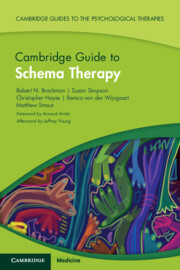Book contents
- Cambridge Guide to Schema Therapy
- Cambridge Guides to the Psychological Therapies
- Reviews
- Cambridge Guide to Schema Therapy
- Copyright page
- Contents
- Foreword
- Preface
- A Note from the Series Editor
- Acknowledgements
- Part I Overview of the Schema Therapy Model
- Part II The Model of Schema Therapy in Practice
- Chapter 3 Schema Therapy Assessment
- Chapter 4 Case Conceptualisation and Mode Mapping in Schema Therapy
- Chapter 5 Envisioning the Road Ahead
- Chapter 6 Intervention Strategies for Schema Healing 1
- Chapter 7 Intervention Strategies for Schema Healing 2
- Chapter 8 Intervention Strategies for Schema Healing 3
- Chapter 9 Intervention Strategies for Schema Healing 4
- Chapter 10 Building Connection to Healthy Modes
- Chapter 11 Bypassing Maladaptive Coping Modes to Support Change
- Chapter 12 Preparing for Termination and the End Phase of Schema Therapy
- Part III Applications and Adaptations for Mental Health Presentations
- Part IV Application of Schema Therapy in Different Populations and in Different Settings
- Appendix Interview Questions/Guidance for the Assessment Process (Chapter 3)
- Index
- References
Chapter 7 - Intervention Strategies for Schema Healing 2
Cognitive Strategies
from Part II - The Model of Schema Therapy in Practice
Published online by Cambridge University Press: 27 July 2023
- Cambridge Guide to Schema Therapy
- Cambridge Guides to the Psychological Therapies
- Reviews
- Cambridge Guide to Schema Therapy
- Copyright page
- Contents
- Foreword
- Preface
- A Note from the Series Editor
- Acknowledgements
- Part I Overview of the Schema Therapy Model
- Part II The Model of Schema Therapy in Practice
- Chapter 3 Schema Therapy Assessment
- Chapter 4 Case Conceptualisation and Mode Mapping in Schema Therapy
- Chapter 5 Envisioning the Road Ahead
- Chapter 6 Intervention Strategies for Schema Healing 1
- Chapter 7 Intervention Strategies for Schema Healing 2
- Chapter 8 Intervention Strategies for Schema Healing 3
- Chapter 9 Intervention Strategies for Schema Healing 4
- Chapter 10 Building Connection to Healthy Modes
- Chapter 11 Bypassing Maladaptive Coping Modes to Support Change
- Chapter 12 Preparing for Termination and the End Phase of Schema Therapy
- Part III Applications and Adaptations for Mental Health Presentations
- Part IV Application of Schema Therapy in Different Populations and in Different Settings
- Appendix Interview Questions/Guidance for the Assessment Process (Chapter 3)
- Index
- References
Summary
Cognitive techniques in schema therapy make use of an array of methods traditionally drawn from cognitive-behavioral therapy (CBT) but which focus on the ‘schema’ or ‘mode’ level. However, in clients with more chronic presentations (e.g. those with a personality disorder), the healthy part as addressed in traditional CBT is often not sufficiently developed. Cognitive methods and techniques in schema therapy therefore need to be adjusted to the particular mode being targeted and must take into account the limited capacity for rational, reflective processing often seen during the initial phases of therapy. Socratic dialogue, for example, might not prove effective when addressing a Parent mode in the start phase of therapy. Frequently used cognitive techniques in the early phase of schema therapy focus on developing awareness of activated schemas or modes through the use of psychoeducation, using the white board or flip-over to reformulate emotional experiences into modes, and the use of cognitive ‘schema’ or ‘mode’ diaries. In the later stages of therapy cognitive techniques are used to change the beliefs in activated schemas or modes. This can include simple (e.g. listing pros and cons of a coping mode) or more complex techniques (e.g. Socratic dialogue).
Keywords
- Type
- Chapter
- Information
- Cambridge Guide to Schema Therapy , pp. 138 - 149Publisher: Cambridge University PressPrint publication year: 2023

